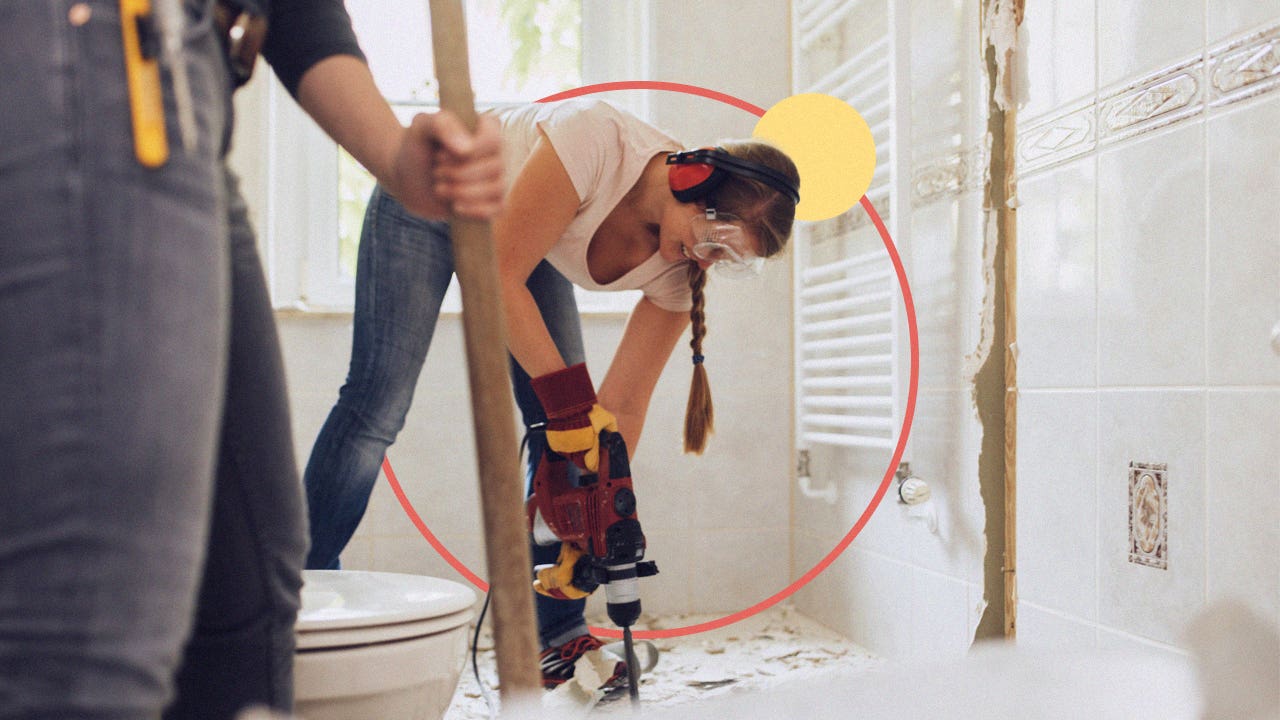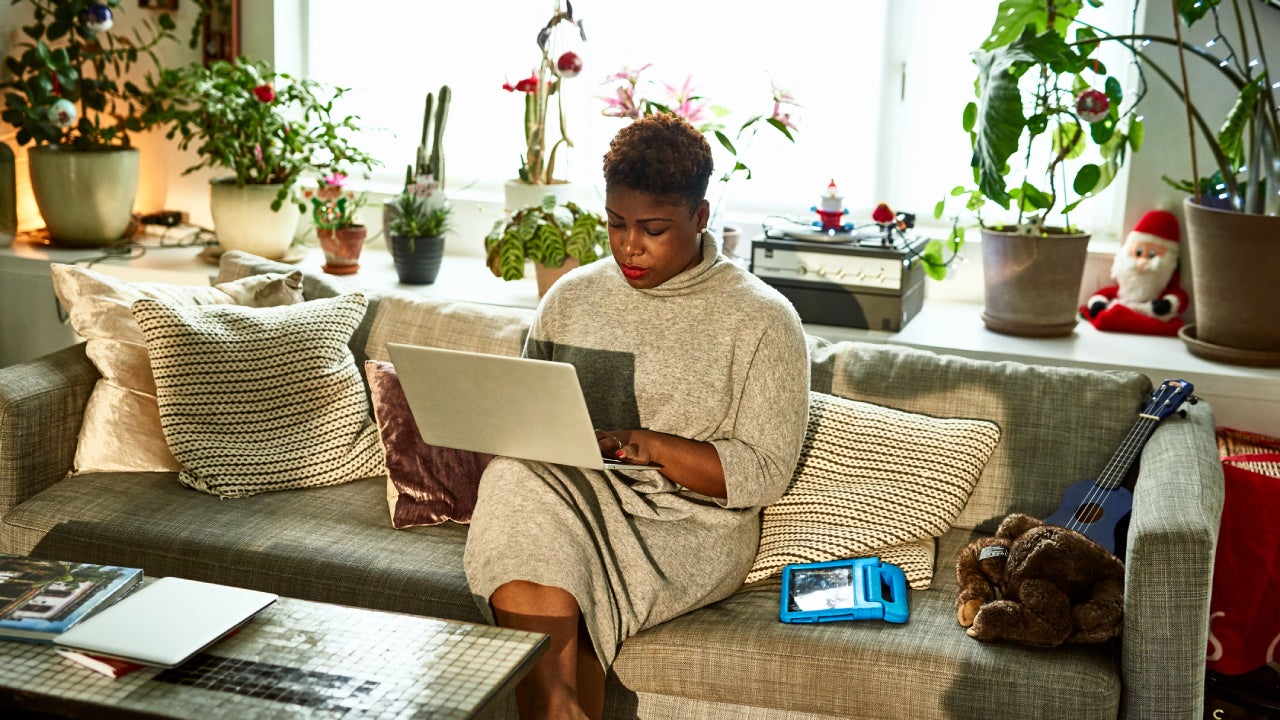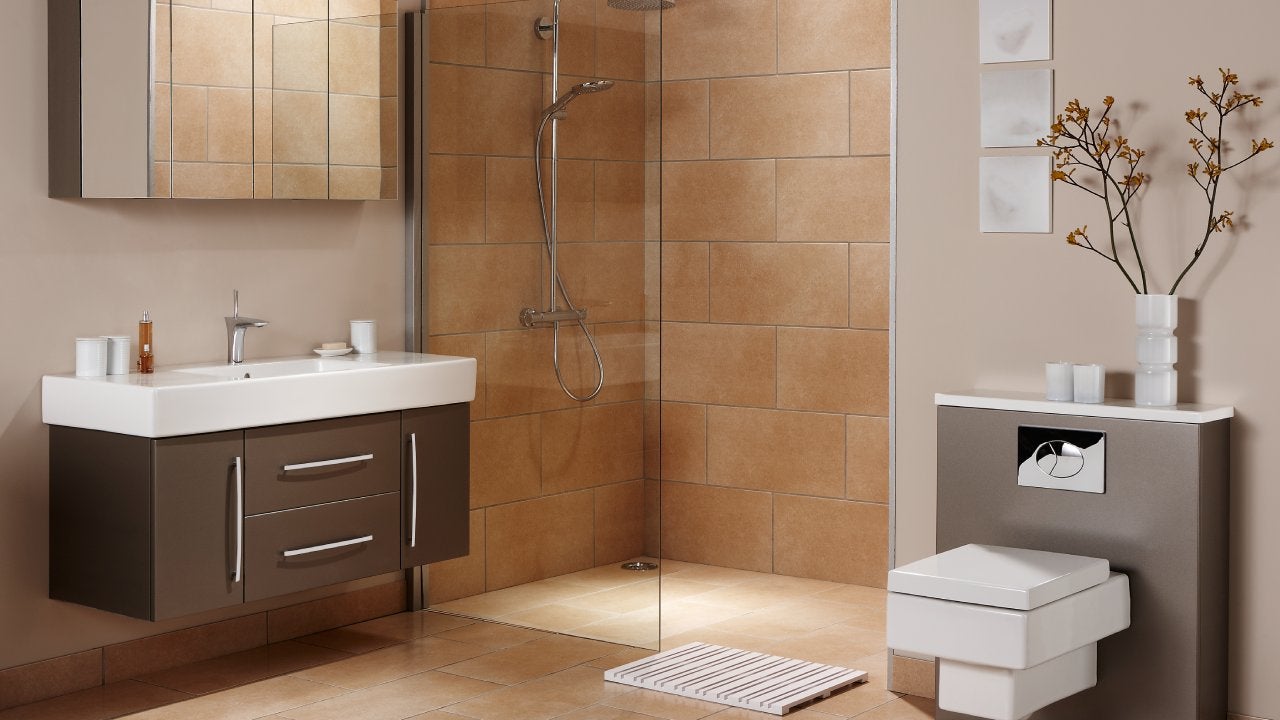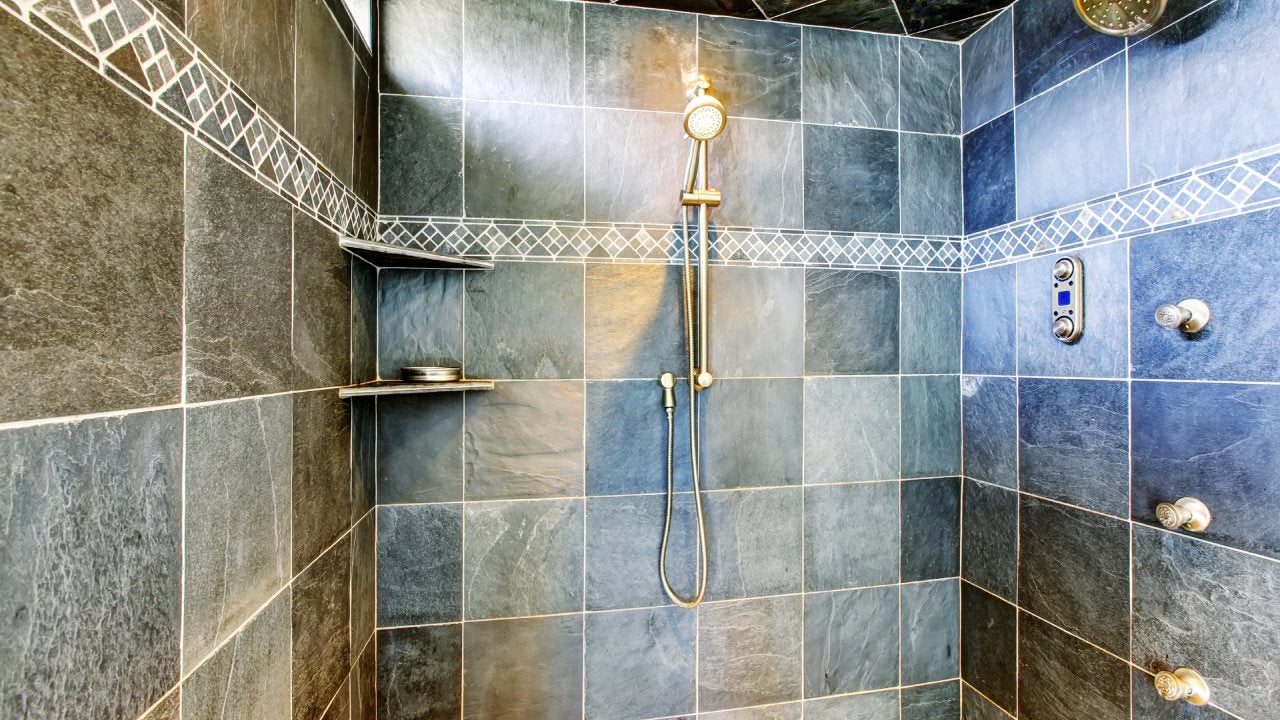How much does a bathroom remodel cost?




The bathroom has come a long way since the first humble pedestal sink and alcove tub. What people want now is a custom look radiating not utility but “joy and tranquility,” as San Diego-based designer Tatiana Machado-Rosas recently told the trade publication Kitchen & Bath Design News — “a personal retreat with a spa-like atmosphere where they can truly relax.”
Oh, and one that will also, of course, increase the value of their homes.
In general, you can expect to spend anywhere from $6,622 to $16,744 on a bathroom remodel, with a national average of $11,365 — about $70 to $250 per square foot, according to 2023 data from home-improvement site Angi. But this is a project with infinite variations, and the costs can quickly climb much higher. Back in 2020 — long before the words “inflation” and “labor shortages” became facts of renovation life — homeowners were already pouring $20,000 to $30,000 into primary-bath redos, a National Kitchen and Bath Association study found. Today, costs can amount to as much as $50,000, or even beyond.
Yet even as their price has risen, so has their popularity: Bathroom remodels were the second most common house service projects in the 2023 Houzz & Home Study, with more than one-fourth (27 percent) of respondents upgrading theirs in 2022.
To calculate the potential cost of the bathroom of your dreams, you’ll need to consider its size, as well as the quality of materials you hope to use and the number of elements you plan to renovate or replace.
Here’s what you should know before taking the plunge.
Key takeaways
- Bathroom remodeling costs from $6,622 to $16,744 (but can be much higher)
- The price per square foot for a bathroom remodel ranges from $70 to $250
- To estimate the cost of a bathroom remodel you need to know the size of the space, the quality of materials to be used and the number of elements to be renovated
How much does a bathroom remodel cost?
As you embark upon a bathroom remodel, there are a few important questions to consider. First and foremost, why do you want to remodel your bathroom? To improve its functionality or efficiency? To enhance its looks? Or are you just hoping to “keep up with the Joneses” with the latest smart features? The answers to these questions will help define the scope of your project and its potential budget.
You’ll also want to consider how long it will take to complete the remodel. This is especially important if your home has just one bathroom. If you’re doing a major overhaul of the space, you may need to develop alternative arrangements for a bathroom while work is taking place. If a contractor is working on your project, they may be able to give you an idea of how long work will take to complete.
Drawing up a budget to cover project costs is another essential step. After identifying how much you can afford to lay out, review the costs associated with your proposed remodel and decide whether you need to cut back anywhere to bring the project within your financial parameters. It’s always a good idea to budget a little more than you think you’ll need in order to be prepared for any unexpected expenses.
Types of bathroom remodels
The cost of a bathroom remodel depends heavily on the extent of that remodel. For example, a low-end bath refresh (cosmetic upgrades, like cool new towel bars and a clean new coat of paint) might drain only a few hundred dollars from your savings account. Replacing or refacing a few items, like the toilet, vanity and medicine cabinet, will see the disappearance of a few thousand.
A primary bath remodel, with top-of-the-line finishes, double sinks and a luxury bathtub, can cost about $30,000. But it’s when you start playing around with the layout that prices hit the serious five figures. Such “upscale bathroom remodels,” as the authoritative trade publication Remodeling calls them, can run over $75,000, once all the relocation and replacement of the fixtures, plus expansion of the space, has been figured in.
Keep in mind: The demolition of your old bathroom can add anywhere from $1,000 to $2,300 to the remodeling cost, according to 2023 data from Angi.
Some sorts of bathrooms cost more than others, due to their square footage — as with most construction jobs, size does matter — and the features they contain.
Powder room/half bath remodel
Needless to say, half baths (powder rooms), at about 30 only 18 to 32 square feet, cost the least to remodel, anywhere from $1,500 to $15,000, clocking at an average of $1,400, Angi says — not just due to size but because they contain less (look, Ma, no tub!).
Guest bathroom remodel
Guest bathrooms, which are typically 80 square feet, cost more than powder rooms but less to remodel than master/bedroom-adjacent bathrooms. It’s partly because they typically have fewer bells, whistles and fancy finishes, and partly because they are smaller and thus have less room various fixtures. Depending on choices, Angi says, a guest bathroom can cost between $3,500 to $20,000 to remodel.
Master bath remodel
A master bath remodel, naturally, will be a far more substantial investment. This is because master bathrooms are often larger and will be the place where you use the best materials and include all the latest gadgets and features. A 120-square foot master bath renovation can cost anywhere from $7,000 to $30,000, according to Angi. This cost range includes such costs as tiling, flooring, counters and even additional plumbing.
Features that can affect the cost of a bathroom remodel
A bathroom remodel involves a surprisingly large number of products and materials that will impact your project’s final price tag. The overall project cost can vary significantly based on the type of materials you choose and the amount you need for each type of material, item or fixture. Some of the factors that influence cost include:
- Number and quality of countertops
- Faucets
- Plumbing
- Sinks
- Toilet
- Bathtubs/showers
- Flooring
- Tiles
- Lighting
Additional costs and considerations when remodeling a bathroom
There are a number of additional factors that can influence the overall cost of a bathroom remodel.
Location
Your geographic location and the usual variances in cost of living and services can have a big impact on the cost of a bathroom remodel. A bath remodel in Peoria, Illinois, according to HomeAdvisor, the homeowner-contractor matchmaker, typically costs from $3,780 to $10,000. Another online service, Sweeten, says the costs for a “mid-grade” job in Houston start at $24,500 while a high-end remodel and expansion in that city might start at $35,500. Meanwhile, in New York City, Sweeten says, a typical primary bath comprising 100 square feet can be redone for a tidy $60,000 to $85,000.
No matter where you live, though, there’s going to be a range of prices for bathroom redos, when the costs mount as the project gets more extensive. And the reasons for that reflect two things: materials and labor costs.
Contractor costs
Labor costs play a big part in any renovation project price tag, but bathroom remodels feature a particularly large cast of contractor characters.
Those contractors and subcontractors can include a designer, building-permit expediter, demolisher, carpenter, plumber, electrician, tile setter, drywaller and painter. “Coordinating multiple trades is like choreographing a dance troupe,” as KBB (the official publication of the National Kitchen and Bath Association) noted in a recent article on bathroom renovations. “Scheduling becomes a fine balance of giving everyone time to complete their appointed tasks and keeping the job moving.”
Sometimes literally: If a worker punches a hole in the wall for the sink drainpipe without studying the specs for the vanity, another worker may not be able to install that vanity at the correct height. If the shower enclosure is mapped out before the fixtures arrive, and someone forgot to measure the new toilet, the layout may not meet building codes. (Yes, there is a minimum distance between a wall and the toilet’s center point.)
Permits
Construction permits are a major expense associated with home renovation projects. The specific cost you’ll pay varies significantly based on where in the country you live. However, you can expect to spend anywhere from as little as $100 to as much as $1,000 depending on the complexity of the construction involved, according to Angi.
Special designs
Baths designed for universal accessibility or simply aging in place can be trickier (read: more expensive). Some homeowners may want a designer and a contractor certified as aging-in-place specialists by the National Association of Home Builders or at a minimum a designer and a builder who are versed in universal design. More important, ADA-compliant baths require extra maneuvering space, so the job may require carving out more room. When a small bath needs to be enlarged to meet ADA requirements, costs tend to double, partly because the number of square feet is larger, according to HomeAdvisor.
Is it better to hire a professional or DIY your bathroom remodel?
Some homeowners try to take on a bathroom remodeling job themselves, stashing products and materials one by one in the garage while lining up subcontractors (plumbers, electricians, carpenters) in hopes they arrive on schedule and in the right order. This way leads to delays, mistakes, and costly overruns. Unless the job just involves some cosmetic upgrades, an extensive bathroom remodel should not be done DIY, but by pros.
Seasoned renovators tend to seek out an experienced general contractor — there are those who specialize in kitchens and baths — while perhaps drawing design advice from space planners on staff at retail showrooms where they know they want to shop; Ikea, for example, offers a service called Bathroom Planner. Armed with a detailed drawing, the general contractor can do the hard work of landing a building permit, ordering products and materials, and coordinating the subs.
For others, the best solution is a so-called design-build firm, a one-stop-shop that keeps responsibility for every element of the remodel under one roof, from designing the layout, sizing the vanity and determining the right height for the toilet paper holder to finding the prettiest moisture-resistant wallpaper and an expert to hang it.
How a bathroom remodel influences your home’s value
Real estate agents often say that when it comes time to sell, a sparkling, updated bath can be a true selling point. Renovated bathrooms rank among the top projects that appeal to buyers and are likely to add value to a home up for sale, according to the National Association of Realtors (NAR) most recent “Remodeling Impact Report.” More than 25 percent of Realtors recommend upgrading them before placing a home on the market.
Not that homeowners get back more than they put into the project. Generally, bathroom remodels average a return on investment of about 55 to 60 percent, according to Angi; the NAR estimates 71 percent. Interestingly, the more lavish the remodel, the less you recoup in costs. According to 2023 data from Remodeling, a “midrange” bath remodel, or one costing $24,606, ups a home’s sales price by $16,413 (a 66.7 percent ROI). Spend $76,827 on an “upscale” remodel — which includes custom cabinets, heated floors and luxe materials — and the rate of return drops to 36.7 percent.
How to finance a bathroom remodel
If you’re ready to remodel your bathroom because you need more space or it’s outdated and desperately needs an upgrade, you’re probably wondering about the best ways to finance this project. Fortunately, you don’t have to pay for it all at once.
Using a personal loan to finance your bathroom remodel
Personal loans come with fixed interest rates, a fixed repayment timeline and a fixed monthly payment that will never change, making them easy to plan for.
One benefit of using a personal loan for bath renovations is that, unlike other borrowing options, you don’t have to put down collateral. And since personal loans are unsecured, the application process is usually much less involved so you can get your money sooner.
Using a home equity loan or a line of credit (HELOC) to finance your bathroom remodel
Another option is a home equity loan. Like a personal loan, home equity loans come with fixed interest rates, a fixed repayment term and a fixed monthly payment. The difference, however, is a home equity loan requires you to pledge your home as collateral.
A home equity line of credit, or HELOC, also requires you to use your home as collateral, but instead of getting a fixed loan amount, you get a line of credit you can borrow against — typically with a variable rate. Like home equity loans, HELOCs tend to come with low rates and fair terms since your home is backing the loan.
In both cases, if you use the money to finance home improvements, the interest could be tax-deductible.
Using a credit card to finance your bathroom remodel
If your remodel is a fairly modest one, consider acquiring a credit card — but not just any credit card. Some balance transfer credit cards, called “0% APR credit cards,” charge no interest on purchases for up to 18 months.
The upside of using one of these offers is the fact you’ll get an interest-free loan to pay for your remodel. And you may get points or rewards for spending a lot during the introductory period, too. Since these offers don’t last forever, though, you need a plan to pay off the entire bath remodel before your interest rate resets to the regular rate.
The bottom line on bathroom remodel costs
From dimmable sconces to ombré steam shower doors, a beautiful new bathroom can deliver joy and comfort at a time when many homeowners could use more of both. But don’t be misled by the size of the space; the cost per square foot of a full renovation can run into hundreds of dollars. It’s key to plan and budget for best-value products and services, and to find a contractor who can carry out the work with expertise and minimum disruption. Financing is also key, whether you decide to draw from savings or take out a loan or line of credit.
Before plunging in, check your budget. There are bathroom remodel estimators online from home renovation sites like Modernize that can help you get an idea of what your plans might cost.
You may also like

Home warranty vs. homeowners insurance


How much does it cost to add a bathroom to your home?

How much does it cost to remodel a shower?

